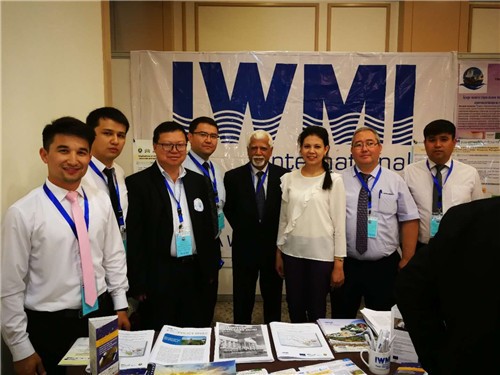United Nations High-level Conference on International Decade for Action, “Water and Sustainable Development” (2018-2028)
Author :wangwc
2018-06-14 16:57
On June 7-8, 2018 an international conference on the topic “Joint actions to mitigate the consequences of the Aral catastrophe: new approaches, innovative solutions, investments” was held in Tashkent, the capital of Uzbekistan.
The purpose of the international conference was to coordinate, in the framework of the International Fund for Saving the Aral Sea, the practical orientation and coordination of activities of the Aral Sea basin countries in solving the problems of the Aral Sea basin, analyzing and evaluating the ongoing programs to mitigate the consequences of the Aral catastrophe and identifying ways of cooperation in implementing projects aimed at improving the environmental and socio- economic situation in the Priaralia region, as well as attracting investments for their implementation. Against this background, it is worthwhile to look at what measures were taken earlier, and the main role in this is assigned to Kazakhstan and Uzbekistan.
Representatives from neighboring governments of the Aral Sea region, agencies of the United Nations system, relevant international organizations and foundations, as well as experts and scholars attended the meeting.
The Aral Sea is located at the junction of Kazakhstan and Uzbekistan. It was the fourth largest lake in the world. Since the second half of the 20th century, the water surface has shrunk rapidly and the water level has been declining. Most of the water surface disappeared in 2014. The area has shrunk from 67,000 square kilometers in the 1960s to about 3,000 square kilometers. This has brought many ecological and social problems such as frequent salt sandstorms, serious salinization of farmland, intensified river pollution, sharp decline of biological species, and endangering public health. It has been called “the biggest environmental disaster of the 20th century” by the United Nations.
The director of the Research Center for Ecology and Environmental in Central Asia (RCEECA), Chen Xi, invited by the Chairman of the Executive Committee of the Central Scientific Committee of the National Ecological Movement of Uzbekistan, Boriy Alikhanov, attended the meeting.
Prof. Chen Xi, presided the sub-conference of “new approaches, innovative solutions, investments for Reducing the Negative Impacts of the Aral Sea on Public Health and the Environment in Central Asia” and accepted interviews with Uzbekistan National Television and Tashkent TV.
During the conference, Prof. Chen Xi also visited the Tashkent branch of the International Water Management Institute, the Tashkent Center of the Global Scallion Garden in China and Uzbekistan. Prof. Chen inspected the ecological status of the Aral Sea and discussed the construction of the Aral Sea ecological field monitoring and Research Station with the Institute of Botany of the Uzbekistan Academy of Sciences.
The Research Center for Ecology and Environmental in Central Asia (RCEECA) was cofounded by nine research institutions, which includes the Xinjiang Institute of Ecology and Geography, the Institute of Tibetan Plateau Research, the Institute of Earth Environment, the Cold and Arid Regions Environmental and Engineering Research Institute, the Institute of Geographical Sciences and Resources, the Nanjing Institute of Geography and Limnology, The Institute of Remote Sensing and Digital Earth, the Shenzhen Institutes of Advanced Technology and the University of Chinese Academy of Sciences.
The Research Center for Ecology and Environmental in Central Asia (RCEECA) is one of the overseas bases for the Chinese Academy of Sciences to develop the reciprocal cooperation with Central Asian countries focusing on the major demand of resources, ecology and environment in Central Asia. At present, there are three overseas sub-centers, fifteen field observation research stations and four agricultural technology demonstration zones in four countries in Central Asia. Among them, there are three field stations and one agricultural demonstration zone in Uzbekistan and significant cooperation has been carried out on the water resource utilization and integrated management, desertification control, biodiversity conservation and efficient agricultural technology of oasis.

